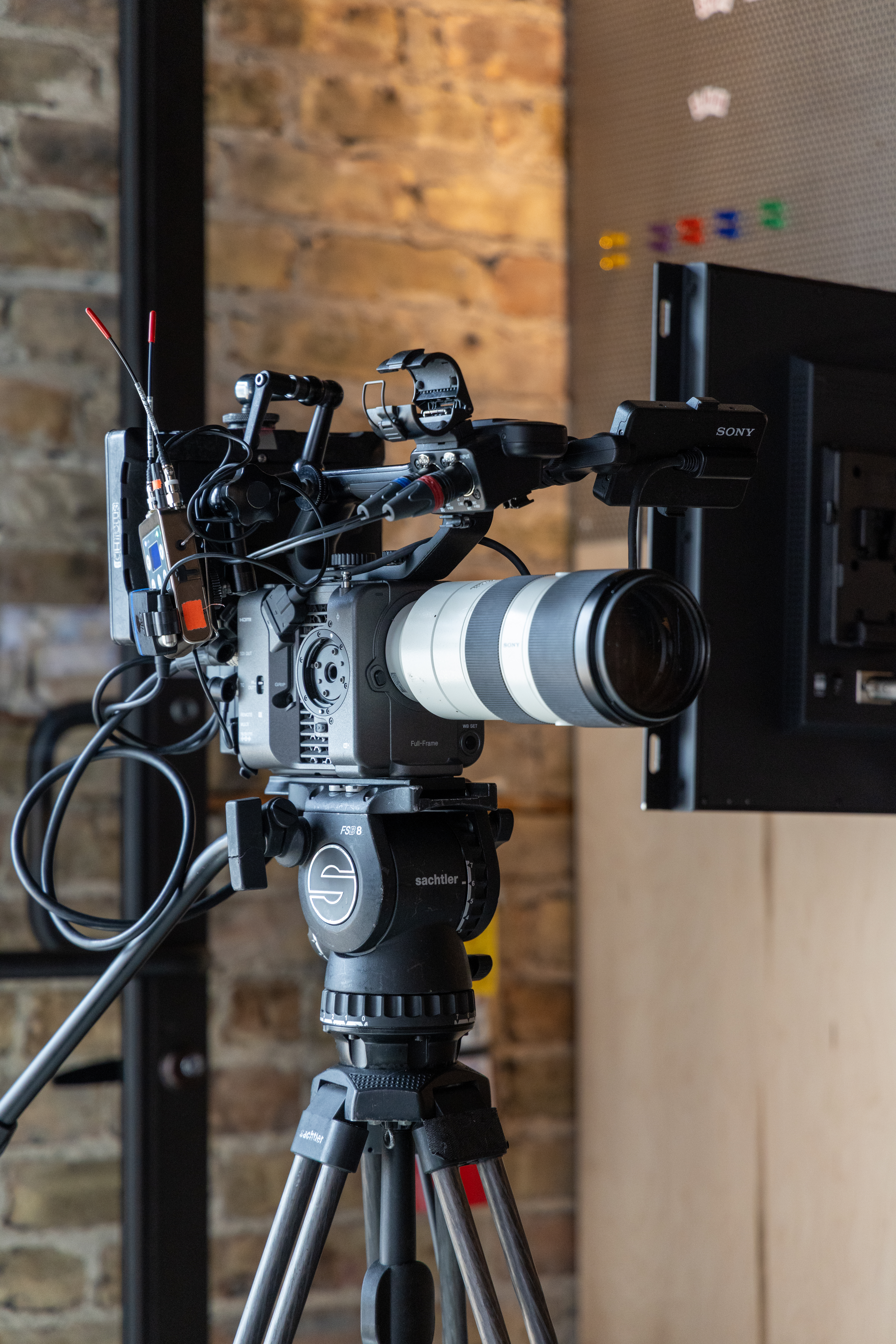Virtual events are no longer “just an option”; they’ve become a standard way to connect, engage, and share experiences.
Maybe an in-person event had to be postponed, or you’re exploring virtual events for the first time. Either way, the shift to digital can feel daunting.
We get it. Trying to recreate the energy of a live event on a screen is tricky. Technology changes fast, audience expectations are high, and the pressure to make every moment count can be overwhelming. It might leave you wondering: Where do I start? How do I make it engaging?
You’ll find all your answers in this blog. We’ll help you think through the most important elements before producing a virtual event video so that you can make confident decisions at every step.
To get started, here are eight essential questions to ask before creating your virtual event video.
1. Who Is Your Target Audience?
Let’s be honest. One of the biggest mistakes with virtual events is trying to speak to everyone at once. When that happens, the message feels generic, and people tune out. Sure, you want reach, but clarity matters more than size.
So, who are you really talking to?
Your target audience is the foundation of your virtual event video. When you understand who is watching, every other decision becomes easier. The tone, the length, the format, even the pacing, will start to make sense. Since virtual events are often chosen for convenience, having clarity and intention matters at every step.
When people feel like an event was made for them, they respond differently. They stay longer. They engage more, and they’re far more likely to come back next time.
That’s why taking time to understand your audience upfront isn’t extra work, it’s smart preparation.
2. What Are Your Goals and Metrics?
Before anything goes into production, you should be clear about why this virtual event video exists. Without clear goals, it’s easy to create something that looks good but doesn’t actually deliver results. And that’s frustrating.
Success isn’t simply hosting an event or getting people to log in. First, you have to decide if you’re trying to drive registrations for a future program, generate qualified leads for your sales team, or build trust with an audience that’s still getting to know your brand. Each of these goals requires a different approach to structuring the content and to what you prioritize during the live experience.
When your goals are clearly defined, they guide every decision that follows. They help determine the length of the event, how interactive it should be, and what metrics actually matter once it’s over. Clear goals keep your virtual event focused, measurable, and ultimately worth the effort.
3. What Is Your Budget Breakdown?
Virtual events are often seen as the “budget-friendly” option, and in many ways, they are. But lower cost doesn’t mean lower standards. When production quality drops, viewer retention often follows, and that’s a risk no one wants to take.
In fact, virtual event statistics show that 75% of virtual event budgets go toward technology, not venues or travel. That shift means your budget is doing very different work than it would for an in-person event, and it needs to be allocated with intention.
This focus on technology is also what makes virtual events effective when done well. Before assigning numbers, it helps to step back and look at the bigger picture. 81% of organizations report higher ROI from virtual events, proving that strong results are possible when the right investments are made.
That’s why many businesses choose to work with a video production company. An experienced partner can help simplify budgeting decisions and make sure that every dollar contributes to a high-quality event that keeps audiences engaged.
4. What Content and Format Fits Best?
Virtual audiences don’t behave like in-person ones. This means your audience is just one notification away from losing focus, which underscores the importance of your content and format.
Research shows that only 7% of attendees want virtual events longer than 1 hour, while 55% prefer sessions under 30 minutes. Engagement also increases dramatically when audiences are invited to participate. Events that include polls, live chat, or Q&A can see engagement boosts of up to 80%.
That’s why virtual content needs to be designed for screens. Get to the point early, keep visuals clean, and avoid long build-ups. Online viewers decide very quickly whether something is worth their time, and clarity helps them stay.
Before finalizing your plan, ask yourself one key question: Does this content invite people to participate or just sit and watch?
5. What Platform and Tech Do You Need?
No matter how strong your content is, the platform can make or break the experience. We’ve all seen it: audio drops, frozen screens, and links that don’t work. That’s why your platform choice isn’t optional. It’s foundational.
When choosing a platform, focus on reliability and scale. The platform should handle your expected audience size without lag, support HD streaming, and allow real-time interaction through chat, Q&A, or breakout rooms. These aren’t “nice-to-haves.” They directly affect engagement and trust.
Here are some widely used virtual event platforms and what they’re best known for:
- Hopin – An all-in-one platform with stages, breakout sessions, virtual expo booths, and networking. Well-suited for large, multi-session events.
- Zoom Events – Built on Zoom’s familiar interface, offering breakout rooms, registration tools, and detailed analytics. Reliable and easy for most audiences.
- Airmeet – Focuses heavily on interaction with virtual stages, networking lounges, and customizable event spaces.
- BigMarker – Strong for webinars and conferences, with built-in automation, email tools, and audience analytics.
- Remo – Known for its “virtual table” layout that encourages face-to-face networking and small-group conversations.
- vFairs – Offers 3D virtual environments and immersive expo halls, often used for trade shows and career fairs.
- Bizzabo – Designed for hybrid and large-scale events, with AI-powered matchmaking and real-time networking features.
The right tech quietly does its job. It supports everything that comes next without calling attention to itself. When it works, people don’t think about the platform at all, and that’s exactly how it should be.
6. How Will You Drive Engagement?
Engagement is what separates a strong virtual event from one that people forget five minutes later.
So, how do you keep people engaged?
Live interaction is the starting point. Polls, Q&A, and real-time chat turn viewers into participants. Opening with a simple icebreaker or welcome poll sets the tone early and signals that this isn’t a sit-back-and-scroll experience. When interaction continues throughout the event, attention stays active, and people get clear moments to react.
You can do this by asking direct questions, inviting quick responses in the chat, or calling out comments live so attendees feel seen. Even small moments of acknowledgment can draw people back in and make the experience feel more personal.
7. What Equipment Supports a Quality Production?
Production quality shapes trust faster than almost anything else. Even great content can struggle if the video looks unprofessional. That’s why you should consider having good equipment a requirement for your setup.
Not sure where to start?
Start with audio, which is often more important than video. A dedicated external microphone, such as a USB or XLR mic, dramatically improves clarity and reduces background noise compared to a laptop’s built-in microphone. Clean audio keeps audiences engaged and minimizes listener fatigue, especially during longer sessions.
Next, focus on video equipment. A high-quality webcam or DSLR-style camera provides sharper resolution, better color accuracy, and improved low-light performance. Pairing your camera with proper lighting guarantees that faces are evenly lit and prevents harsh shadows that can distract from the message.
Then, focus on your internet connection. A stable setup is non-negotiable for any virtual event. Wherever possible, speakers should use a wired Ethernet connection and test the exact location they’ll be presenting from in advance. A minimum upload speed of 10+ Mbps helps prevent freezes, lag, and awkward interruptions.
Finally, protect the experience with technical rehearsals. Run full technical tests a few days before the event. Don’t forget to practice transitions, camera framing, and interactive moments to build confidence and prevent last-minute stress.
8. Are You Prepared with a Team? Have You Scheduled Time for Rehearsals?
No virtual event runs smoothly because of one person. Behind every successful event is a team that knows its role and has practiced together. Without that structure, things fall apart quickly.
You might be wondering what “the right team” actually looks like. At the center is the event lead. This person keeps everything moving. They focus on setting goals, aligning timelines, coordinating speakers, and making sure nothing slips through the cracks. They’re the point of clarity when decisions need to be made fast.
From there, roles start to branch out. A technical producer manages the platform, audio, video, and live transitions. A moderator or host guides the conversation, monitors chats and Q&A, and keeps energy steady. Support roles handle things like speaker prep, troubleshooting, and audience communication, so minor issues don’t become big distractions.
Rehearsals pull everything together. Most successful virtual events require 3–6 weeks of preparation. That gives the team time to fix issues early and makes for a better virtual event.
When the team is prepared and rehearsed, the event will feel calm, professional, and in control, even when the unexpected happens.
Wrapping It All Together
Planning a virtual event video can feel overwhelming. There are many moving parts, and it’s easy to miss something important.
If you feel it’s all too much to handle, it’s best to connect with a video production company with experience in video and event production.
When you work with Bottle Rocket Media, you’re partnering with a team that understands your vision and goals, will help shape and streamline your content, translate ideas into clear, engaging visuals, and manage the technical and creative sides of virtual event production.
If you have questions about virtual event video production and want it to stand out for the right reasons, we’re here to help.
To learn more about Bottle Rocket Media and what we can do for your brand, connect with us.





